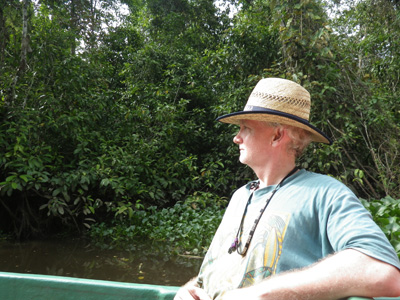Life is Field Work
Read! This is as good an instruction that you can give anyone in almost any circumstance - advice that you might expect from a publisher. So why would I be so keen to support the field work that the Department has organised in Panama last year and in Borneo this September when I could donate some books or access to digital resources in order to satisfy a philanthropic urge?
Cambridge gave me some terrific memories but few rival the memories of the summer field trip to Wells on the North Norfolk Coast. Coming from Norwich and being a member of the Norfolk Wildlife Trust, I thought I knew the area quite well, but my eyes were truly opened to the area's rich natural history during those summer days of 1983. Our project was to observe the foraging behaviour of Oystercatchers on mud flats and tidal estuaries. I remember one of the conclusions was that there was just one population of Oystercatchers exhibiting equal preference for the mussel beds and nearby fields: at the time it was thought that there were distinct communities of birds with preferences for one habitat over another: but the field course taught me some life lessons too. In the process of observing, taking notes, sharing hypotheses and trying to imagine and then measure what factors influence Oystercatchers' decision making, I learnt to tackle new perspectives, detach myself from my own prejudices and those in the scientific literature, and try to think like another organism; and all this in an unfamiliar environment. Not easy for any 20-year-old, especially before the advent of social media. To stand back and appraise the situation is in itself a great life lesson, and whilst that can be accomplished to some degree in a classroom over a book, a field trip sharpens the process.
Thirty-plus years later I find myself managing a multiracial high-performance team across 8 countries in the Asia Pacific region from my home of Singapore. I have recently been asked by colleagues in head office the secrets of our success. Asia Pacific has certainly been a resource-rich environment, but I have no doubt that the consistency of the sustained performance of the operation is partly a result of my applying lessons learnt whilst lying in Norfolk mud with a pair of binoculars. There is not room to write about all the lessons learnt on a field trip that may be applicable to business/management, but here are my top three:
- Collaboration in stressful environments: a rising tide may be akin to a looming deadline, but the key lesson is learning to trust your partner.
- Good preparation saves time and sharpens observations: reflecting on the previous day's experiences and applying lessons quickly is a component of this.
- When new areas of ambiguity and complexity reveal themselves, seek expert advice: we had Nick Davies on hand in Norfolk and I would advise identifying good mentors throughout life's learning journey at whatever stage you are.
Find out more...
First Part II Zoology Tropical Field Course: a student's view


